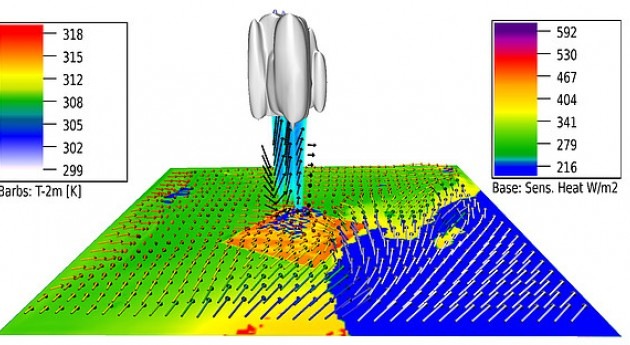Large-scale plantations in desert regions offer several advantages. Firstly, plants bind carbon dioxide and thus help to store carbon. Secondly, large plantations can lower the mean temperature and trigger precipitation in arid regions. This special bio-geoengineering method is particularly relevant to the climate crisis, as the plantations can thus counteract water scarcity and mitigate greenhouse gas emissions. Dr. Oliver Branch and Prof. Dr. Volker Wulfmeyer from the University of Hohenheim in Stuttgart have developed a new global index to find out where these plantations can most effectively increase rainfall. The researchers’ findings have now been published in the renowned scientific journal "Proceedings of the National Academy of Sciences" (PNAS).
A bit of good news at a time when the media are filled with stories about the negative human influence on the Earth system: "Large plantations, e.g. with jojoba plants, significantly increase the amount of solar energy absorbed by the earth's surface," said Dr. Branch, earth system scientist and head of the study at the University of Hohenheim.
With the plantations, rain can be produced in the desert and the regional climate can be influenced positively
"The plants then release most of the energy into the ambient air in the form of heat," the researcher stated. A warm area with low air pressure, called a thermal heat-low, then develops above the desert. "The pressure differences in the vicinity of the plantations create upwelling areas that can lead to the formation of clouds and precipitation."
With the plantations, rain can be produced in the desert and the regional climate can be influenced positively. "Of course, we can only change the global climate if the CO2 uptake has a global impact," said Prof. Wulfmeyer, who helped supervise the project. "But even this step can influence the weather and make life in dry and hot areas more bearable for people."
Global Feedback Index: Simulations show the most suitable areas
The strength of the effect depends on the region and the season. "Whether and how well the formation of clouds and precipitation works depends on many factors," explained Dr. Branch. For example, the prevailing wind speeds and atmospheric stability are key.
On the basis of weather data from the last 40 years, the researchers developed monthly maps for the entire globe
Thanks to a new method, this can now be quantified for the first time and specific measures for reforestation can be started and monitored: Oliver Branch developed the "Global Feedback Index" based on numerical model simulations. The value, between 0 and 3, indicates how well an area is suited for growing plantations for the purpose of precipitation formation. "Three is the best value," said Dr. Branch. "Areas that have this value include parts of the Arabian Peninsula, Namibia, and the Sahara. We are planning further simulations for these areas."
On the basis of weather data from the last 40 years, the researchers developed monthly maps for the entire globe. "Since it takes a lot of calculations to make such a project a reality, we used the Cray supercomputer at the HLRS, the high-performance computing center of the University of Stuttgart. There we carry out high-resolution simulations in order to find the most suitable areas," said Dr. Branch.
Using many variables, the simulations can reliably determine where this method for cloud and precipitation formation can work. The scientists call it bio-geoengineering - a term for methods with which people aim to consciously optimize the climate on earth by influencing the biosphere. "Every desert is different," explained Branch. "While a 100 km x 100 km plantation would make a big difference and produce summer clouds and rain in Oman, the effect would not be as strong in Israel, for example.”
Jojoba: one plant - many advantages
The type of plant is also important. Jojoba bushes are particularly well-suited because they bind large quantities of CO2 during growth and can withstand high temperatures. They thereby contribute to ‘negative emissions,’ that is, the recovery of CO2 from the atmosphere. "In this way, the plantations can mitigate the effects of the climate crisis while at the same time counteracting its further progression," summarized Dr. Branch. In addition, these plants transpire very little during the day, so the thermal heat-low effect is especially pronounced.
Using many variables, the simulations can reliably determine where this method for cloud and precipitation formation can work
The plantations also offer further advantages for the population: "Jojoba, for example, can be used to produce a high-quality oil that is in great demand on the market," said Branch. "The shrubs can therefore also be used economically." As a renewable raw material, biomass from the plants can be used in energy production. "Since jojoba is a low-maintenance plant, it can also thrive well in desert regions," said Dr. Branch. "It only needs moderate irrigation, and that water need not necessarily be drinking water quality."
Publication in the scientific journal PNAS
The recent publication shows that researchers now understand complex feedback processes sufficiently to be able to quantitatively influence regional weather and climate. For this reason, this work by the University of Hohenheim represents a new way of using bio-geoengineering to meet one of the most urgent challenges of our time: influencing the weather and climate for the benefit of humankind.



